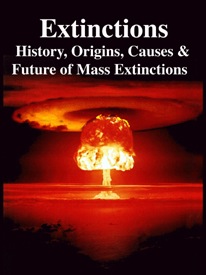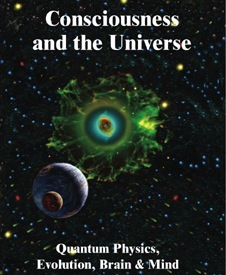|
|
|||||||||||||||
Journal of Cosmology, 2009, Vol 1, pages 57-59 Cosmology, 2009 Did Life Originate on Other Planets? Conrad Istock, Ph.D., Department of Ecology and Evolutionary Biology, Visiting Fellow, Cornell University
Dr. Joseph has put forth a provocative thesis which is guaranteed to excite passionate debate on both sides of the issue. Joseph (2009) opens with an emphatic assertion; "A comprehensive theory based on a review of scientific findings published in prestigious scientific journals, is presented to explain how life on Earth came from other planets." Soon however, he produces a juxtaposition that some readers might find confusing and less assertive; "As only life can produce life, then life on Earth also came from life which may have originated on planets which orbited the parent star." Some might interpret this shift from "came" to "may" as a relaxation of his
certainty about panspermia as the source of life on Earth. Instead, this subtle shift represents an introduction to his theory, but at the same time exposes its weakness. He never explains how life "originated" on those other planets.
Some readers may also be confused by his assertion: "only life can produce life," a phrase he repeats several times in his paper. What does he mean by this? Is it a creationist stance? No. Its exactly the opposite. Instead he surprises the reader with another shift, this one not so subtle when he writes;
"claims as to the abiogenic origins of Earthly life are based on belief in super
natural forces ...," and then, "no one has demonstrated or proved that life
can be produced from non-life. Abiogenesis is not even a true scientific
theory, but should instead be considered a speculative hypothesis devoid of
fact-based scientific support."
Joseph (2009) attacks not only religion but takes direct aim at abiogenesis by stating these theories are due to belief in supernatural forces. Some readers might be surprised by these assertions which I believe lays bare a central weakness of his theory. How did life originate?
I have
no difficulty thinking that life has originated on other planets and may have
traveled in Earth's direction from time to time since our planet formed. I am
fascinated by the exciting chemical analyses of meteorites, like Murchison,
that reveal evidence of proteins and nucleic acids, and possible microfossils (Cooper et al. 2001; Cronin et al. 1993; Hayatsu et al. 1975; Hoover 2006; Folsome et al. 1973; Stoks and Schwartz 1979, Van der Velden and Schwartz 1977).
However, I cannot also reject other working hypotheses including the
"RNA World," (Woese 1968) as Joseph does in the following quote. "Even the hypothesis
of an "RNA World" where the first living things are said to have had an
RNA-based genome (Woese 1968), is fatally flawed, as demonstrated by the
reproductive strategy of viruses, whose RNA-based genomes require the
DNA of a living host. By contrast, the maxim: only life can produce life, has
never been discredited."
Still, RNA viruses undoubtedly have an
evolutionary history and could have moved from freely replicating to
invasion of procaryotes and eucaryotes. There are also DNA viruses, and
different RNA and DNA viruses exist as single or double stranded molecules
suggesting a lot of evolutionary change in their histories. A maxim is an
expression of a general truth, one not testable. Unanswered questions
remain and there are many weaknesses in Joseph's theory which must be addressed.
Someday we may understand the origin of the first replicons within
organic and inorganic chemical milieus forming under early planetary
conditions—milieus dictated by laws of physics and chemistry. Today, we
are beginning to understand some remarkable later events when the
evolution of archaea and bacteria interacted to give rise to eucaryotes.
Patterns that involved formation of mosaic genomes within cells inhabited
by nuclei, ribosomes, endosymbionts giving rise to mitochondria and
chloroplasts, cell differentiation, multicellularity, and much more—
exploding biological diversity that took over Earth from two billion years
ago onward, never looking back.
References
Cooper, G., Kimmich, N., Belisle, W., Sarinana, J., Brabham, K., Garrel, L., 2001. Carbonaceous meteorites as a source of sugar-related organic compounds for the early Earth. Nature 414, 879–883.
Crick, F. 1981. Life Itself. Its Origin and Nature. Simon & Schuster, New York.
Cronin, J.R., Pizzarello, S., Epstein, S., Krishnamurthy, R.V. 1993. Molecular and isotopic.analysis of the hydroxyl acids, dicarboxylic acids and hydrocarboxylic acids of the. Murchison meteorite. Geochim. Cosmochim. Acta 57, 4745–4752.
Folsome, C.E., Lawless, J., Romiez, M., Ponnamperuma, C. 1973. Heterocyclic compounds recovered from carbonaceous chondrite. Geochim. Cosmochim. Acta 37, 455–465.
Hayatsu, R., Studier, M.H., Moore, L.P., Anders, E. 1975. Purines and triazines in the Murchison meteorite. Geochim. Cosmochim. Acta 39, 471–488.
Hoover, R. B., 2006. Comets, carbonaceous meteorites, and the origin of the biosphere. Biogeosciences Discussions, 3, 23–70.
Joseph, R. 2009. Life on Earth came from other planets. Journal of Cosmology 1, 1-56.
Stoks, P.G., Schwartz, A.W., 1979. Uracil in carbonaceous meteorites. Nature 282, 709–710.
Van der Velden, W., Schwartz, A.W. 1977. Search for purines and pyrimidines in Murchison meteorite. Geochim. Cosmochim. Acta 41, 961–968.
Woese, C. (1968). The Genetic Code. Harper & Row. |
|
|
|
|
|
|
|
 Colonizing the Red Planet ISBN: 9780982955239 |
 Sir Roger Penrose & Stuart Hameroff ISBN: 9780982955208 |
 The Origins of LIfe ISBN: 9780982955215 |
 Came From Other Planets ISBN: 9780974975597 |
 Panspermia, Life ISBN: 9780982955222 |
 Explaining the Origins of Life ISBN 9780982955291 |












